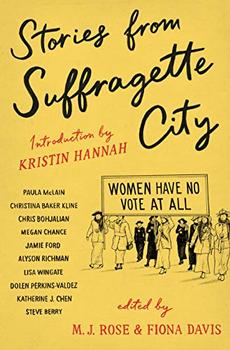Summary | Excerpt | Reading Guide | Reviews | Beyond the Book | Read-Alikes | Genres & Themes | Author Bio

This article relates to Stories from Suffragette City
 A couple of the pieces in Stories from Suffragette City — most notably "American Womanhood" by Dolen Perkins-Valdez — explore the often forgotten reality that Black and other non-white women were explicitly excluded from the movement for women's suffrage in America.
A couple of the pieces in Stories from Suffragette City — most notably "American Womanhood" by Dolen Perkins-Valdez — explore the often forgotten reality that Black and other non-white women were explicitly excluded from the movement for women's suffrage in America.
In the late 19th/early 20th centuries, some Black women involved in activism felt an element of tension with regard to their race and gender. Some organizations and individuals fighting for racial equality were not so keen on advancing the rights of women, while some women's suffrage organizations were dismissive of the fight for racial equality. The American Equal Rights Association was formed in 1866 to "secure Equal Rights to all American citizens" by suffragists Elizabeth Cady Stanton and Susan B. Anthony, and abolitionist and Black rights activist Frederick Douglass served as one of its vice presidents. The organization disbanded just three years later due to in-fighting about whether or not to support the 15th Amendment, which extended suffrage to Black males. While arguing against the amendment, Stanton made abhorrent racist comments about men of color, suggesting that they were not educated or civilized enough to take part in the political process.
Because they were made to feel unwelcome in activist spaces primarily occupied by white women, many Black women started or joined organizations with a narrower focus. Activists Charlotte Forten Grimké and Josephine St. Pierre Ruffin formed the National Association of Colored Women (NACW) in 1896. The NACW was a federation of small local organizations, and the work they did included race- and gender-based suffrage activism. Journalist and civil rights activist Ida B. Wells established the Alpha Suffrage Club in 1913. This organization was focused on Chicago politics, canvassing for Black candidates and others who would best serve the needs of the city's Black population, among other activities. Famously, the Alpha Suffrage Club attended the 1913 Suffrage Procession in Washington D.C., where they were asked to walk at the end of the parade, segregated from the white attendees. This sparked considerable outrage and Wells and most of the other Black marchers defied the request.
In addition to Wells and the others mentioned, there were many more prominent Black suffragists who worked tirelessly integrating both aspects of their identities into their activism. Abolitionist and poet Frances Harper spoke passionately at the National Women's Rights Convention in 1866: "We are all bound up together in one great bundle of humanity, and society cannot trample on the weakest and feeblest of its members without receiving the curse in its own soul...I tell you that if there is any class of people who need to be lifted out of their airy nothings and selfishness, it is the white women of America." Harper served as the first president of the NACW. Scholar and activist Anna Julia Cooper was a co-founder of both the Colored Women's League and the Colored Women's YWCA, in addition to being a teacher and author. Both groups worked toward the education and general advancement of Black women. In a famous speech at the World's Congress of Representative Women in Chicago in May 1898, Cooper spoke powerfully and explicitly of the importance of securing equal rights for women of all races, stating "the acquirement of her 'rights' will mean the final triumph of all right over might, the supremacy of the moral forces of reason, and justice, and love in the government of the nations of earth."
These are just a few of the many Black women who fought for suffrage, and their stories are still often marginalized in favor of those of their white peers like Anthony and Stanton. For more information, check out the Digital Public Library of America's collection on Black Women's Suffrage.
by Lisa Butts
Ida B. Wells, courtesy of the National Park Service
Filed under People, Eras & Events
![]() This "beyond the book article" relates to Stories from Suffragette City. It originally ran in January 2021 and has been updated for the
March 2022 paperback edition.
Go to magazine.
This "beyond the book article" relates to Stories from Suffragette City. It originally ran in January 2021 and has been updated for the
March 2022 paperback edition.
Go to magazine.
Give me the luxuries of life and I will willingly do without the necessities.
Click Here to find out who said this, as well as discovering other famous literary quotes!
Your guide toexceptional books
BookBrowse seeks out and recommends the best in contemporary fiction and nonfiction—books that not only engage and entertain but also deepen our understanding of ourselves and the world around us.